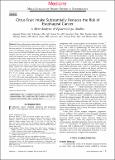| dc.contributor.author | Wang, Anqiang | en_US |
| dc.contributor.author | Zhu, Chengpei | en_US |
| dc.contributor.author | Fu, Lilan | en_US |
| dc.contributor.author | Wan, Xueshuai | en_US |
| dc.contributor.author | Yang, Xiaobo | en_US |
| dc.contributor.author | Zhang, Haohai | en_US |
| dc.contributor.author | Miao, Ruoyu | en_US |
| dc.contributor.author | He, Lian | en_US |
| dc.contributor.author | Sang, Xinting | en_US |
| dc.contributor.author | Zhao, Haitao | en_US |
| dc.date.accessioned | 2015-11-03T15:58:05Z | |
| dc.date.issued | 2015 | en_US |
| dc.identifier.citation | Wang, Anqiang, Chengpei Zhu, Lilan Fu, Xueshuai Wan, Xiaobo Yang, Haohai Zhang, Ruoyu Miao, Lian He, Xinting Sang, and Haitao Zhao. 2015. “Citrus Fruit Intake Substantially Reduces the Risk of Esophageal Cancer: A Meta-Analysis of Epidemiologic Studies.” Medicine 94 (39): e1390. doi:10.1097/MD.0000000000001390. http://dx.doi.org/10.1097/MD.0000000000001390. | en |
| dc.identifier.issn | 0025-7974 | en |
| dc.identifier.uri | http://nrs.harvard.edu/urn-3:HUL.InstRepos:23473975 | |
| dc.description.abstract | Abstract Many epidemiologic studies indicate a potential association between fruit and vegetable intake and various cancers. The purpose of this meta-analysis is to investigate the association between citrus fruit intake and esophageal cancer risk. The authors conducted a comprehensive search on PubMed, EMBASE, and the Cochrane Library from inception until July 2014. Studies presenting information about citrus intake and esophageal cancer were analyzed. The authors extracted the categories of citrus intake, study-specific odds ratio or relative risk, and the P value and associated 95% confidence intervals for the highest versus lowest dietary intake of citrus fruit level. The association was quantified using meta-analysis of standard errors with a random-effects model. Thirteen case–control studies and 6 cohort studies were eligible for inclusion. Citrus intake may significantly reduce risk of esophageal cancer (summary odds ratio = 0.63; 95% confidence interval = 0.52–0.75; P = 0), without notable publication bias (intercept = −0.79, P = 0.288) and with significant heterogeneity across studies (I2 = 52%). The results from epidemiologic studies suggest an inverse association between citrus fruit intake and esophageal cancer risk. The significant effect is consistent between case–control and cohort studies. Larger prospective studies with rigorous methodology should be considered to validate the association between citrus fruits and esophageal cancer. | en |
| dc.language.iso | en_US | en |
| dc.publisher | Wolters Kluwer Health | en |
| dc.relation.isversionof | doi:10.1097/MD.0000000000001390 | en |
| dc.relation.hasversion | http://www.ncbi.nlm.nih.gov/pmc/articles/PMC4616874/pdf/ | en |
| dash.license | LAA | en_US |
| dc.subject | Meta-Analysis of Observ Studies in Epidemiology | en |
| dc.title | Citrus Fruit Intake Substantially Reduces the Risk of Esophageal Cancer: A Meta-Analysis of Epidemiologic Studies | en |
| dc.type | Journal Article | en_US |
| dc.description.version | Version of Record | en |
| dc.relation.journal | Medicine | en |
| dash.depositing.author | Miao, Ruoyu | en_US |
| dc.date.available | 2015-11-03T15:58:05Z | |
| dc.identifier.doi | 10.1097/MD.0000000000001390 | * |
| dash.contributor.affiliated | Miao, Ruoyu | |


